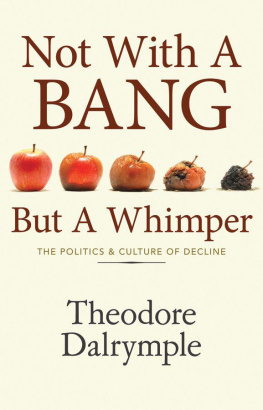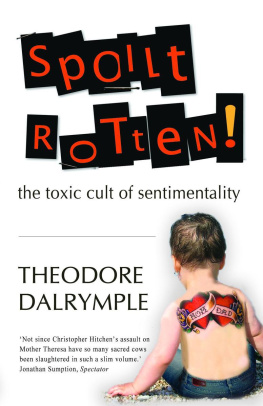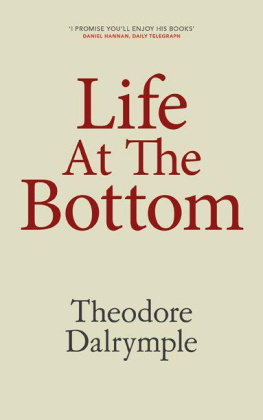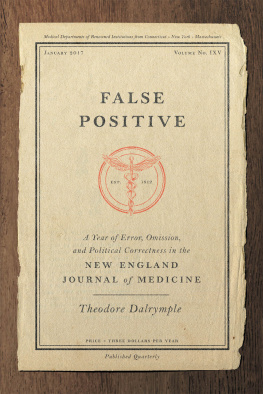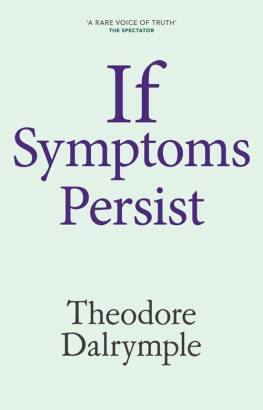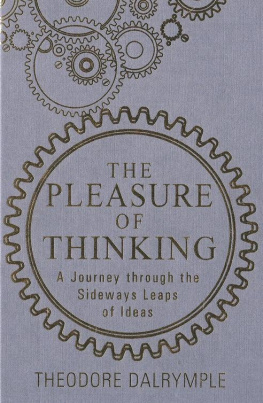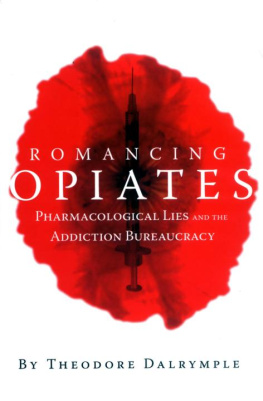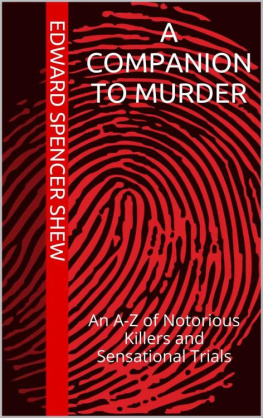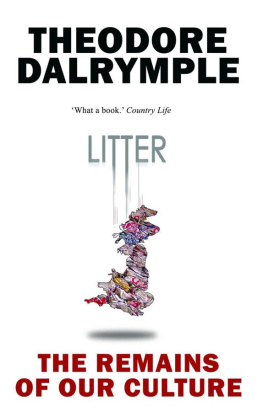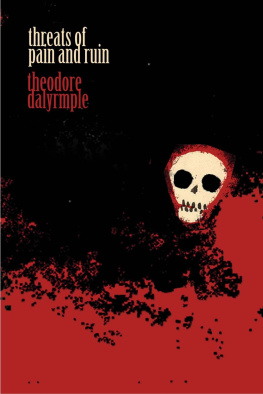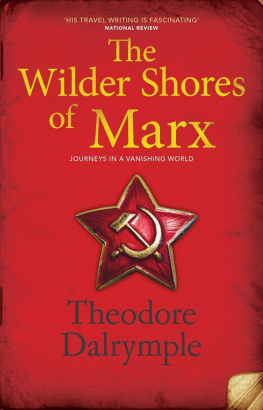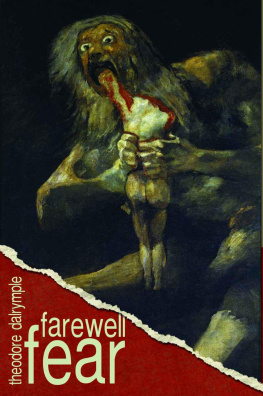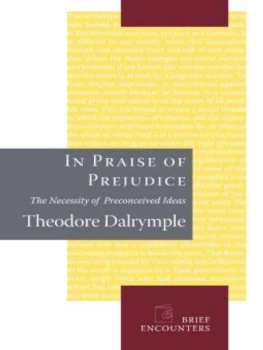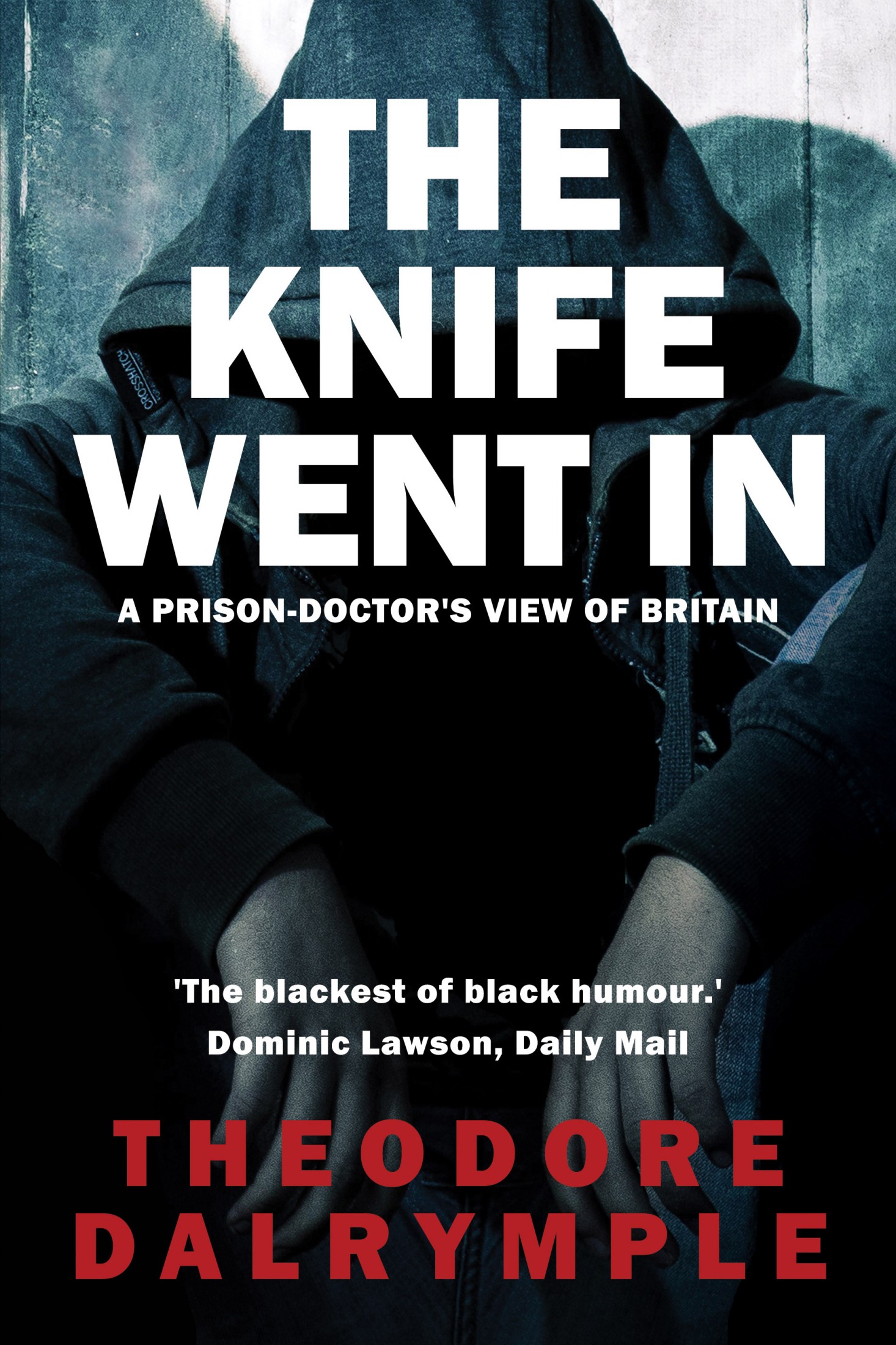Dalrymple Theodore
The Knife Went In: A Prison Doctor's View of Modern Britain
http://www.gibsonsquare.com
Printed ISBN: 9781783341184
Ebook ISBN: 9781783341191
E-book production made by Booqla
Published by Gibson Square
Copyright 2017 by Gibson Square
Praise for this book
A razor-sharp expose of our broken society Both funny and a badly needed corrective to conventional wisdom hugely readable gripping real-life stories tells a deep truth about the sort of society we have become. A future historian, a century hence, will learn more about 21st Century Britain from this book than from any official document. So will you. Please read it. Peter Hitchens, Mail on Sunday
Nobody has observed the fallacies of modern England with a clearer eye, or a more intelligent quill. It would be nice to know that the BBC had heard of him because we could expect to hear him deliver next years Reith Lectures. Sunday Telegraph
Dalrymple is [o]ne of the most interesting men of our times There is nothing in his tale to celebrate, yet in the telling he deserves the commendation of anybody who values human civilization. The Times
#1 Amazon bestseller, popular culture
The Knife Went In
I have met quite a number of murderers as a prison GP and psychiatrist. I was a very young doctor when I met my first, a man in late middle-age who strangled his wife because (he said) she would not leave him to read his evening paper in peace when he returned home from work, and in talking her little drop-earrings jiggled most provokingly. Without criminal antecedents, it was thought he must be mad and was sent to hospital rather than prison. I felt honoured to shake so bad a mans hand, never having met anyone half as wicked before.
He, it turned out, was almost the only murderer I was ever to meet who resembled slightly the type described by Orwell in his essay, The Decline of the English Murder, whom the English so liked to read about between the wars. This type of murderer was respectable, even religious, middle- or lower-middle class, leading something of a double life, and impelled either by greed for the life insurance he had taken out on his victim or the need to cover up an illicit affair. The only two murderers whom I met who killed for life insurance waited no longer than two weeks after the sum assured was increased dramatically before disposing of their victims, thus providing something of a clue as to their motivation.
I did however observe one peculiar phenomenon in the prison where I started to work twenty years ago a prisoners use of the passive voice as a means of distancing himself from his own decisions, and of persuading others of his lack of responsibility for his actions. I first noticed the phenomenon when speaking to murderers who had stabbed someone to death and who invariably said, The knife went in, as if it were the knife that guided the hand rather than the hand that guided the knife. Such a murderer may have crossed the city, taking a knife with him, to confront the very person against whom he bore a serious grudge. Yet still it was the knife that went in. When I relayed this observation to my wife, also a doctor, she thought I was exaggerating. But one day she was in her clinic when she asked an elderly widow how her husband had met his death. The knife went in, the widow said. My wife, astounded, waited for the end of the consultation to telephone me to tell me.
I subsequently noticed that prisoners often used similar locutions, though only to describe their bad behaviour, never their good behaviour. The beer went mad or The beer took over were phrases that alcoholics favoured, as if the beer drank them rather than the other way round. Heroin addicts, describing how and why they started to take heroin, almost invariably said that they fell in with the wrong crowd. When I replied that I found it strange that I met many people who fell in with the wrong crowd, but never any member of the wrong crowd itself, they invariably laughed. Foolishness is not the same as stupidity.
Of course, we all employ the method from time to time. We are all like murderers in that we seek freedom from the moral responsibility of our worst acts, which is why The Knife Went In is the title of this book or at least one reason.
The language of prison fascinates me. It was always vivid and expressive, and, in a way, beautiful. My heads cabbaged meant that a person was in such as tormented state that he was not fully responsible for his actions. Youre not going to nut me off, are you, doctor? was a fearful enquiry as to whether I was going to send the prisoner to a psychiatric hospital (psychiatric wards in the NHS are infinitely worse than prison). A prisoner who had just been sentenced to life imprisonment would say, The judge lifed me off.
The crimes of the great majority of the murderers whom I encountered were merely sordid. A drunken or drug-intoxicated quarrel over nothing, such were the circumstances of most those crimes. The most trivial pretext of a murder I encountered was a remark about the brand of trainers the perpetrator was wearing, which he considered humiliating. This no doubt is powerful testimony to the tender egos, of some of our fellow citizens, inflamed by their subordinate position in the world. We are very far from the social atmosphere in which a man may kill a woman and then play Nearer my God to thee on a harmonium next door.
I still hoped that one day I would be called in as an expert on an Agatha Christie-type murder, a vicar who had poisoned a squire in a library, for example, but I never was. Most likely this was because not many vicars poison squires in libraries these days.
Nor was George Orwell the first person to notice the decline in the English murder in its quality, that is, not the quantity. Virginia Woolfs father, Sir Leslie Stephen, did so as long ago as 1869, at the very commencement of what Orwell thought was the golden age of English murder, when petty bourgeois non-conformist religious hypocrisy set the tenor of the times.
The last murder in which I was involved was a squalid quarrel over a 10 debt, or rather was committed in an attempt to recover that debt. There are still corners of our society not as small, perhaps, as we should like to imagine in which such sums are deemed worth fighting over, and even killing for.
In the city where the murdered man lived, he was one of the unemployed who formed a common sort of informal drinking club in which the members staggered the days of their receipt of social security so that they could buy drink throughout the week. He had borrowed 10 during a drinking bout that he refused to repay. The other four members of the club, one of them a woman of about thirty, went to extract the money from him. It was she I was asked to examine, in a case of psychiatric extenuation. It was suggested by her lawyer that she might be mentally deficient.
Her defence was that she had done nothing, that she was only a bystander. It was they who had killed him. They all claimed the same thing, of course. But what violence. The four of them turned the victims flat in a tower block into a torture chamber. The victim, besides being an alcoholic, was disabled, close to heart failure, and able to move to and from his electrically-reclining chair only with difficulty. That made it easier to torture him. They broke his legs, they broke his ribs (all of them), they fractured his skull. They boiled kettles and poured the water over him. Still no 10.
Eventually, they concluded that he really didnt have the money. He wasnt just trying to blag them, as the local expression has it, and the four left the flat together to go for a drink, having already consumed what was in his flat. They left him alive, but only just. He must have died within the hour.


